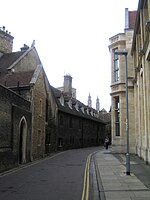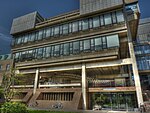Pembroke Street, Cambridge

Pembroke Street is a street in central Cambridge, England. It runs between Downing Street and Tennis Court Road at the eastern end and a junction with Trumpington Street at the western end. It continues west on the other side of Trumpington Street as Mill Lane. To the south of the street, along its entire length, is Pembroke College, hence the name. In the 20th century, the architect W. D. Caröe added the Pitt Building between Ivy Court and the Alfred Waterhouse former Master's Lodge, and extended New Court with the construction of a new staircase on the other side of the Lodge. He linked the two buildings with an arched stone screen, Caröe Bridge, along Pembroke Street in a late Baroque style. To the north at the eastern end is the New Museums Site of the University of Cambridge. The Cambridge University Department of Chemical Engineering was located here until 2017. Just to the north of Pembroke Street is the Whipple Museum of the History of Science in Free School Lane, which leads off Pembroke Street. Botolph Lane runs parallel with Pembroke Street just to the north of it, between Free School Lane and Trumpington Street, to the south of Corpus Christi College.
Excerpt from the Wikipedia article Pembroke Street, Cambridge (License: CC BY-SA 3.0, Authors, Images).Pembroke Street, Cambridge
Pembroke Street, Cambridge Newnham
Geographical coordinates (GPS) Address External links Nearby Places Show on map
Geographical coordinates (GPS)
| Latitude | Longitude |
|---|---|
| N 52.2023 ° | E 0.1192 ° |
Address
Pembroke Street
Pembroke Street
CB2 3QY Cambridge, Newnham
England, United Kingdom
Open on Google Maps










